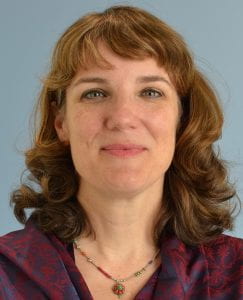
Walter Crowell University Professor of Social Sciences Lisa Dierker received a Fulbright Specialist Award to promote and share the Passion-Driven Statistics curriculum she helped develop around the world. Professor Dierker began serving her four-year Fulbright Specialist Award term in January 2021.
Each year, 425 Fulbright specialists travel abroad to spread their work in their respective fields. In the next four years, Dierker will have the opportunity to engage in long-term relationships with institutions to help develop their version of the Passion-Driven Statistics curriculum.
“A program of the U.S. Department of State, the Fulbright Specialist Program is a unique opportunity for U.S. academics and established professionals to engage in two- to six-week, project-based exchanges at host institutions across the globe,” the Fulbright website reads.
The Passion-Driven Statistics curriculum aims to engage students with data analysis by presenting them with real data and exploring research techniques motivated by their own questions. The Quantitative Analysis Center (QAC) holds several sections of the QAC course “Applied Data Analysis,” which employs the Passion-Driven Statistics curriculum, each semester. In QAC 201, students from all academic backgrounds learn in a flipped classroom environment and study different methods of data analysis.
“It’s a lot of different things,” Dierker said. “It’s a math statistics course. It’s a psychology statistics course. It’s a research methods course in sociology, and political science, and biology. It’s been picked up across a lot of disciplines and it’s really just a way of getting students excited about data and research methods.”
Dierker incorporated interest-motivated data analysis in her courses before she developed the official Passion-Driven Statistics curriculum. When the QAC opened in 2009, Dierker applied for a National Science Foundation (NSF) grant to develop the curriculum. The grant has since been renewed three times.
“When the QAC started, there became this multidisciplinary home where the goal was to excite students about applied statistics and data analysis, and this was a great home for it,” Dierker said.
Since its introduction, the course has evolved to become more interactive and serve more students. Director of the QAC Professor Emmanuel Kaparakis currently teaches QAC 201 and is impressed with this expansion.
“Now we are offering the course every semester and during the winter session and during the summer session, and all of the sessions are over-enrolled,” Kaparakis said. “Typically during the semester we have between eighty to a hundred students in the course, and it has been very exciting to see that type of response, and I hope that continues.”
In addition to instituting the curriculum at the University, Dierker has worked to employ the Passion-Driven Statistics curriculum at institutions across the United States. The Fulbright Specialist Award will provide her with the opportunity to expand the reach and strength of the program.
“I think what the Fulbright award will allow me to do is to visit an institution and work with a larger number of faculty in a way that can help build real capacity,” Dierker said. “This one-faculty-at-a-time version, it’s working, but it’s a slow go.”
Dierker first spread the curriculum at academic conferences, where she would present on the curriculum and learn from other scholars.
“I’ve been so inspired by the things I’ve seen in taking this model to different places that I hope to do that,” Dierker said. “I think every university has special things that are going on—things that are unique to that space—and I’m really excited to learn from the different places. I hope to be able to know what their special feature is that I can continue to learn from.”
Dierker had already worked with international universities before receiving the Fulbright Award. She previously worked with professors at Ashesi University in Ghana to help implement the Passion-Driven Statistics curriculum to support their business and engineering programs.
“They’ve done amazing things with it,” Dierker said. “They’ve made it their own and it’s just so exciting to see. I think the most exciting thing was [that] they were teaching larger numbers of students in Ghana with this model than we were even teaching in the QAC here at Wesleyan.”
The Fulbright Specialist Award provides a mutually beneficial experience for both Dierker and the University. Dierker’s work will allow her to bring back the changes and improve Wesleyan’s version of Passion-Driven Statistics.
“The work that Professor Dierker is doing with other institutions also changes both in the approach or the focus on a particular area, and that comes back and may affect also the changes we’re making here,” Kaparakis said. “So it’s a feedback loop.”
Another one of these benefits is the expanded data sets that Dierker’s work with foreign universities will give her access to.
“One thing that’s really exciting about this model is that we use real data, and the more people we have access to around the world, the more exciting data sets you learn about and you have the opportunity to use and explore,” Dierker said.
Dierker’s colleagues are also excited about the prospect of spreading the Passion-Driven Statistics curriculum.
“It is very exciting to me to see how Professor Dierker’s work has received so much attention and acceptance not only nationally, but internationally at this point. And it is even more exciting to see how the particular pedagogical model has been accepted by the Wesleyan students,” Kaparakis said.
Orly Meyer can be reached at omeyer@wesleyan.edu


Leave a Reply